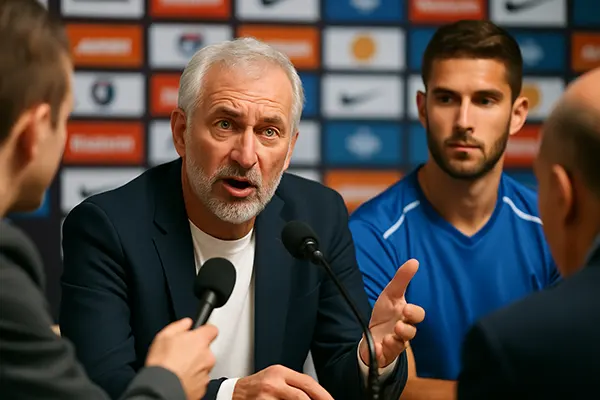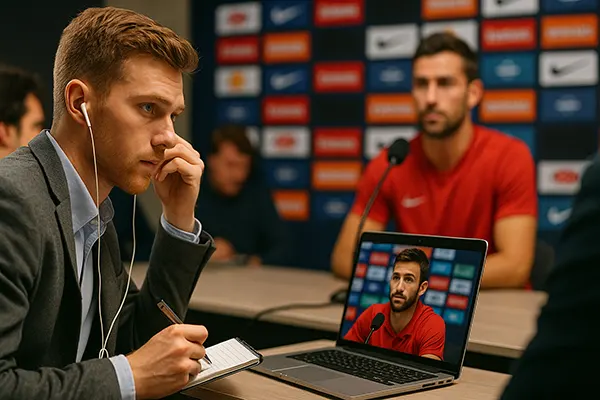
How to Read Between the Lines at Press Conferences: Finding Signal for Betting
Professional sports press conferences are often overlooked by casual punters, but within seemingly ordinary words can lie the keys to strategic betting decisions. Managers and players sometimes hint—consciously or not—at their tactical adjustments, squad issues, or morale levels. By learning to “read between the lines”, one can interpret subtle signals that may influence the outcome of a match and gain a valuable analytical edge in sports betting.
Manager Quotes: The Hidden Indicators of Squad Rotation
When coaches speak ahead of a match, their words can suggest tactical plans, player conditions, and selection priorities. These aren’t always explicit. Instead, seasoned listeners learn to pay attention to tone, word choice, and what is not being said. For example, phrases like “we’ll see how he trains tomorrow” may hint at doubts about a key player’s fitness or involvement.
A clear example occurred in January 2024, when Pep Guardiola said before a midweek FA Cup tie: “Some of the lads have played a lot of minutes lately.” He didn’t confirm a rotation, but betting markets reacted quickly, pricing in possible squad changes. Indeed, Manchester City fielded a mostly second-string lineup, and the underdog odds shortened accordingly—offering value for attentive bettors.
Similarly, Jurgen Klopp has in the past hinted at fatigue and mental strain during congested fixture periods. When he stated, “We have to manage the load and think long-term,” just days before a clash with a lower-ranked opponent, it led to early speculation about fielding academy players. As expected, the line-up was youthful and the match was closer than the odds suggested.
Recognising Verbal Cues of Tactical Caution
Coaches sometimes use cautious language to downplay expectations, especially ahead of tough away matches or when the team is under pressure. Statements such as “We must respect the opponent” or “It’s a tricky tie” may be interpreted as psychological shielding—but can also indicate a defensive setup is likely.
Understanding this helps when betting on markets like “under total goals”, “first-half draw”, or “no goal both halves.” A relevant case was when Diego Simeone said before an away Champions League match in March 2023: “We need to stay compact and patient.” As anticipated, the game was a 0-0 draw, offering excellent returns for those who aligned their bets with this insight.
The key is in knowing the speaker. Some managers are habitually vague, others strategic in their media handling. It is essential to track their past press behaviour, building a profile of reliability and implication value for each one.
Player Interviews: Signals of Mental and Physical Fatigue
Player pre-match interviews can be equally telling. Footballers rarely reveal exact tactics but often let slip emotional states, injury concerns, or subtle frustration. These elements are critical when assessing team chemistry and expected intensity levels.
For instance, in April 2024, a defender from AC Milan said: “It’s been a tough few weeks, and everyone is just trying to hold on.” That week, Milan lost to a mid-table side in Serie A. Although the squad was physically fit on paper, this comment hinted at deeper fatigue and disengagement—factors that impacted performance on the pitch.
Another telling moment occurred in La Liga when a striker confessed: “It’s hard to stay focused when there’s speculation about transfers.” Such quotes not only affect the player’s form but may also signal internal distractions within the dressing room, which can be decisive in evenly matched games.
Assessing Motivation Through Language and Demeanour
Body language and choice of words can reveal how motivated a team truly is. When players appear unenthusiastic, avoid eye contact, or repeatedly use phrases like “we’ll try our best” without conviction, these can be early signs of low morale. Bettors who notice such indicators may choose to avoid backing that team or explore handicaps favouring the opponent.
In contrast, signs of motivation are often visible in proactive statements. A forward declaring “We owe our fans a performance” might indicate a desire to bounce back after a poor game—adding potential value to goal scorer or team total markets.
These nuances are especially useful in cup games, relegation battles, or matches where stakes are unclear. Publicly declared ambition is sometimes the only solid basis for gauging mental readiness before team sheets are published.

Reading Between the Lines: Developing an Analytical Routine
Interpreting press conferences demands consistency and context. A single quote should not form the basis of a large bet. Instead, it’s about building a routine of collecting, comparing, and contrasting statements over time. With practice, patterns emerge—and those patterns offer an edge.
Start by following post-match and pre-match press releases from official club sites and trusted journalists. Pay attention to coaches and players who are habitually transparent, and treat their statements as high-value data points. Create logs of recurring phrases and what they preceded in terms of performance and result.
Many professional punters maintain spreadsheets tracking manager tendencies, such as how often a phrase like “we’ll give others a chance” led to a rotated squad. Over a season, these indicators become statistically significant—transforming press talk into betting signals.
Tools to Aid Interpretation and Reduce Bias
To avoid personal bias, use transcripts, not just highlight clips. Emotionally loaded words may sound stronger than they read. Reviewing the full context can prevent misinterpretation. Also, compare statements across both teams in a fixture. Often, insight arises not from one quote but from how it contrasts with the opponent’s messaging.
Various data tools such as NLP-based sentiment analysis can now assist in flagging passive or uncertain language. While still developing, these can be used to support human judgement, not replace it. Betting remains a blend of art and analysis, and language interpretation sits at that intersection.
Above all, press conferences are public rituals of messaging and expectation management. For the informed listener, they offer more than quotes—they offer edges. Learning to hear what’s meant, not just what’s said, is what separates a guess from a strategy.
